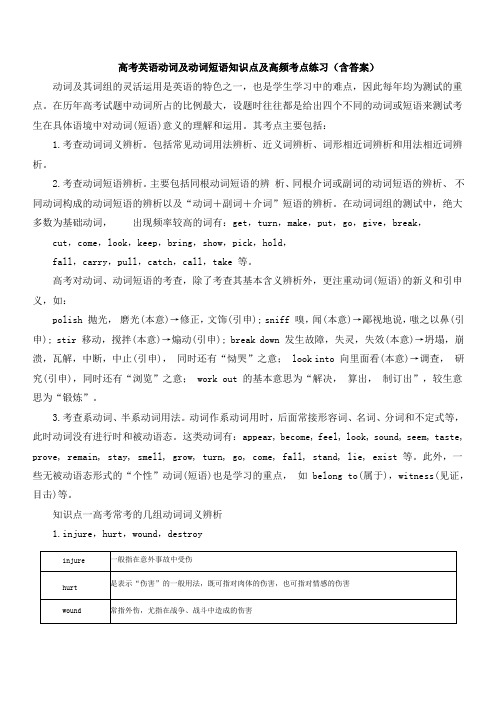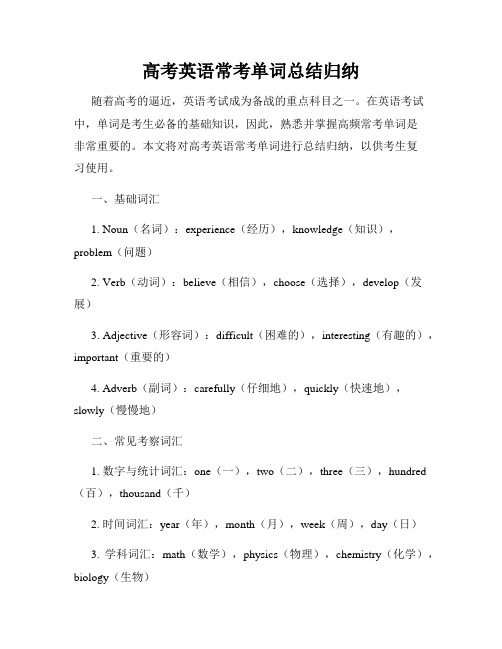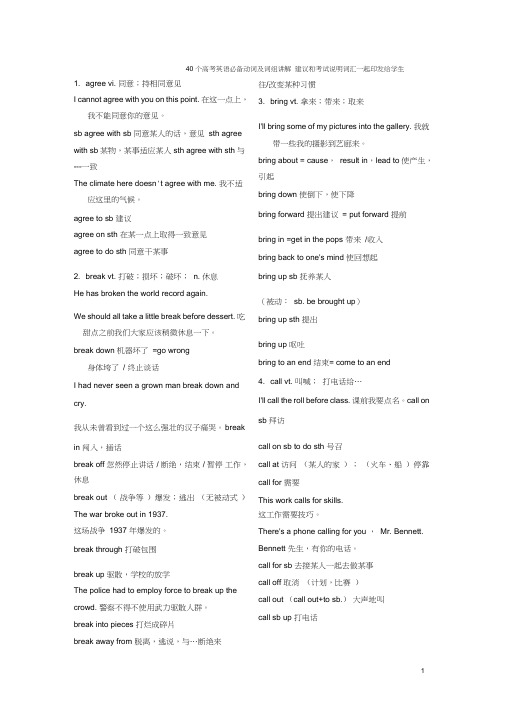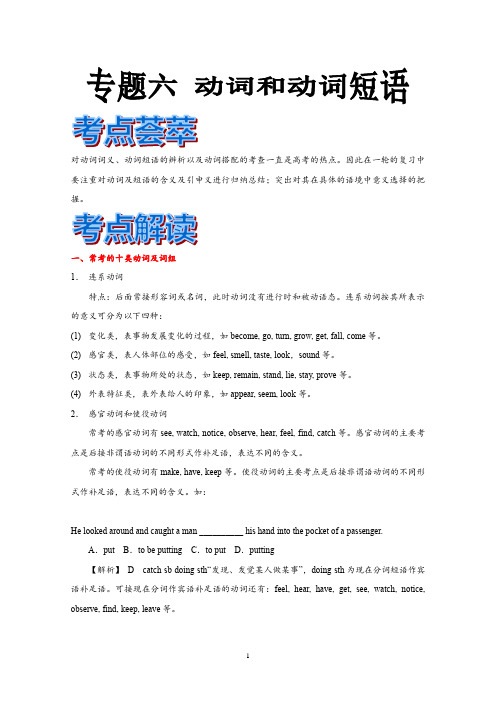高考英语常考动词短语归纳及考察
高考英语动词及动词短语知识点及高频考点练习(含答案)

高考英语动词及动词短语知识点及高频考点练习(含答案)动词及其词组的灵活运用是英语的特色之一,也是学生学习中的难点,因此每年均为测试的重点。
在历年高考试题中动词所占的比例最大,设题时往往都是给出四个不同的动词或短语来测试考生在具体语境中对动词(短语)意义的理解和运用。
其考点主要包括:1.考查动词词义辨析。
包括常见动词用法辨析、近义词辨析、词形相近词辨析和用法相近词辨析。
2.考查动词短语辨析。
主要包括同根动词短语的辨析、同根介词或副词的动词短语的辨析、不同动词构成的动词短语的辨析以及“动词+副词+介词”短语的辨析。
在动词词组的测试中,绝大多数为基础动词,出现频率较高的词有:get,turn,make,put,go,give,break,cut,come,look,keep,bring,show,pick,hold,fall,carry,pull,catch,call,take 等。
高考对动词、动词短语的考查,除了考查其基本含义辨析外,更注重动词(短语)的新义和引申义,如:polish 抛光,磨光(本意)→修正,文饰(引申); sniff 嗅,闻(本意)→鄙视地说,嗤之以鼻(引申); stir 移动,搅拌(本意)→煽动(引申); break down 发生故障,失灵,失效(本意)→坍塌,崩溃,瓦解,中断,中止(引申),同时还有“恸哭”之意; look into 向里面看(本意)→调查,研究(引申),同时还有“浏览”之意; work out 的基本意思为“解决,算出,制订出”,较生意思为“锻炼”。
3.考查系动词、半系动词用法。
动词作系动词用时,后面常接形容词、名词、分词和不定式等,此时动词没有进行时和被动语态。
这类动词有:appear, become, feel, look, sound, seem, taste, prove, remain, stay, smell, grow, turn, go, come, fall, stand, lie, exist 等。
高中英语高考常见动词短语归纳总结

英语高考常见动词短语归纳总结♣ look 的常用短语:look up … in查找look sb. up and down 上下打量look back to/ upon回顾look upon…as把… 看作look forward to期待look through浏览; 看穿take a new look呈现新面貌♣ fear的常用短语:in fear害怕地(be) in fear of 害怕for fear of/ that担心;生怕♣ concentrate 的常用短语:concentrate on 专心…concentrate one’s mind on 专心于…类似的短语:fix one’s mind uponfocus onput one’s heart intofocus one’s mind on♣surprise常用短语:in surprise惊讶地to one’s surprise 使某人惊讶的是be surprise at/to do/that对某事感到惊讶♣表示“穿衣”的动作或状态的词和短语1.表示动作的有:pull onput ondressdress sb2. 表示状态的有:wearbe inbe dressed inhave … on♣常见表“喜欢”的短语和单词likecare forbe keen onbe fond oftake delight in…♣ trouble的常用短语:have much trouble / no trouble (in) doing 在…有/没有困难take great trouble to do不辞辛劳做某事put sb t o the trouble of doing …为难某人做某事make trouble捣乱be in (great) trouble惹麻烦;处在困境中help sb. out of trouble帮某人摆脱困境♣ end的常用短语:come to an end……结束put an end to 结束……on end竖起, 连续in the end终于; 最后end up (by) doing…以……结束make both ends meet收支相抵♣ 表示“导致”、“由…引起”的短语:1. 导致cause sth. (to do)result inlead to2. 由……引起be caused byresult fromgrow out oflie in♣表“全力以赴”的短语:do / try one’s bestspare no efforts to dotake great pains to dogo all out to dodo what somebody can (do) to dodo all somebody can (do) to do♣ direction常用短语:in (the ) direction of….朝……方向under the direction of ...在……的指导下follow the directions照说明去做♣ far常用短语:far from (being)离……要求相差很远far from +(a place)距离某地很远far away遥远so far 到目前为止; 那么远as far as sb. knows/sees据某人所知by far(最高级前,比较级后)起强调作用♣ distance常用短语:in the distance在远处from/ at a distance从远处keep sb. at a distance于某人保持一定距离It is no distance at all.不远♣ use常用短语:used to do过去曾经、常做be used to doing …习惯于……be used to do被用来做……make good/ full use of充分利用……come into use开始使用……it is no use doing …干……没有用♣“出了什么事”的几种不同表达What’s wrong with….?What’s the matter with…?What’s the trouble with…?What happened (to sb.) ?♣“众所周知”常用表达法:It is known to all that…主语从句,that 不能省As is known to all,定语从句,置于句首We all know (that)后接宾语从句Everyone knows (that)后接宾语从句, which is known to all.非限定从句,置于句末♣表“同意某人意见”的常用短语:agree with sb. /what sb. saidagree to sth.approve (of) sth.in favour of sth.be agreeable to sth.be for sth.“不同意”disagree with sb./ what sb. saidobject to sth.disapprove (of) sth.be against sth.♣ sign的常用短语:sign one’s name签名sign to sb (not) to do sth.示意某人(不)做某事signs of ………的迹象♣would rather 与prefer 的区别1.宁愿做……而不做……would rather do A than do Bprefer A to Bprefer to do A rather than do B2. would rather 主语+ 过去式,表示“宁愿”eg. I would rather you came tomorrow than today.should prefer sb. to do sth./ should prefer 主语+ 过去式,表示“比较喜欢……”eg. I should prefer you not to go there alone.OR: I should prefer that you did not go there alone.♣trap常用短语be caught in a trap落入圈套be led into a trap中圈套set a trap to do sth.设圈套……be trapped in sth.被…..所围困♣ grow常用短语in the grow of在….成长中grow up长大; 成长grow rich on靠….. 变富grow into长成……grow out of由…..引起/滋生出♣ make常用短语be made up of =consist of 由……组成make up for弥补be made from/ of由……造成make up编造;组成;化妆be made into制成……make fun of取笑; 嘲弄make a living 谋生supply, provide, offer 的区别:1.表示“向某人提供某物”supply / provide sb. with sth.supply / provide sth. for sb.supply sth. to sb.offer sb. sth.2. 表示“主动提出做某事”offer to do sth.3. 表示“倘使”、“假如”provided / providing that= on condition that=only if4. 表示“满足需要”supply / meet a need.♣ supply的常用短语in short supply 缺乏,不足medical/military supply医疗/军用品supplies of…许多♣ lack的常用短语be lacking in sth. 在……不足make up for the lack of弥补……的不足for/by/from/thr ough lack of…由于…不足,缺乏have no lack of不缺♣damage的常用短语do damage/harm to 对……有害cause damage to 对……造成损害ask for damage要求赔偿die of 与die from 的区别die of 表示“死于……病”或冻死、气死,或死于过度悲伤。
高考英语动词及动词短语

动词和动词短语知识一、动词的分类:1、行为动词(实义动词)①及物动词(带宾语):study, develop;②不及物动词(不带宾语)work, swim, go, come③状态动词(相对静止)contain, exist, own, prefer, belong④动作动词:延续性(work, stay);非延续性(marry, go, come)2、连系动词(汉语中没有这种词类)3、助动词(与动词原形或分词构成复合谓语)be(am,is,are),do(does,did);have(has);will,would,shall4、情态动词can(could),may(might),must,shall(should)二、短语动词常见的构成方式及其注意点1、动词+副词所构成的短语动词分及物的和不及物的两类Please turn every light in the house off. 请把房子里的每一盏灯都关掉。
(及物)Harry turned up after the party when everyone had left.晚会后,人们都已离去,哈里出现了。
(不及物)注意:①如果宾语较长,就应避免把副词同动词分开She turned off all the lights which had been left on. 她关掉了所有还在亮着的灯。
②如果宾语是人称代词,只能放在动词和副词之间She gave them away.她送掉了它们。
③同一动词和不同副词搭配时,意义上有很大的差异ring back回电话 ring off挂断电话 ring up打电话put away放好 put on穿,上演 put up挂起,举起④不同动词和同一副词搭配时,在意义上有很大的差异break out发生,爆炸 carry out进行,开展 go out熄灭hand out分发 let out放出 look out当心 sell out卖完set out出发 take out取出 work out算出2、动词+介词(及物)I'm looking for my glasses. 我在找我的眼镜。
备战2023年高考英语考点一遍过考点07动词和动词短语含解析

考点07 动词和动词短语高考频度:★★★★★英语动词根据其意义和句法作用,可分为实义动词、连系动词、助动词和情态动词四大类。
实义动词又称行为动词,为表示动作或状态的动词,可以单独充当句子的谓语,实义动词有及物动词和不及物动词两类。
英语中的动词短语通常由动词加介词、副词、名词等构成,在句中起动词的作用。
高考设题时往往都是给出四个不同的动词或短语来测试考生在具体语境中对动词短语词意的辨析及其理解和运用能力。
考向一常用动词辨析1.advise,persuade,suggestadvise用作及物动词,表示"劝告,忠告,建议",强调提醒或引起注意;persuade表示"说服",强调劝说成功,主要搭配是:persuade sb.to do sth.说服某人做某事(相当于persuade sb. into doing sth.);如表示劝说但不一定成功,则使用try to persuade sb.to do sth.或advise sb.to do sth.。
suggest用作及物动词,意为"建议",后接名词、代词、动名词或从句,从句中的谓语用"should+动词原形",should可以省略。
2.bring,take,carry,fetchbring"带来,拿来,取来",强调从别处带人或物到说话人所在地。
take"拿走,带走",强调把人或物从说话者身边带走,方向与bring相反。
fetch"去拿来,去取来",强调从甲地出发到乙地取物或人后,又回到甲地,相当于go and bring。
carry"携带,搬运,运送",强调用人力或车辆把人或物从一地运到另一地。
3.win,beat,defeatwin表示"赢得,战胜"时,宾语多是比赛项目等。
win sb.则指"赢得人心"。
beat/defeat意为"打败,击败",其宾语只能是人或由人组成的机构。
如:beat sb.打败某人;defeat their team/ the country/the enemy击败了他们的队/国家/敌人。
高考英语词汇和短语汇编常用动词短语及真题分析

高考英语常用动词短语及真题分析考点1. break相关短语①Let’s break up the whole into parts.让我们化整为零。
② You must break away from these old customs.你们必须破除这些旧风俗。
③ The dog broke away from its owner and ran away.狗挣脱了主人,跑了。
④ After a long time of hard work,he almost brokedown.长时间艰苦劳动之后,他的身体几乎垮了。
⑤ Why did the peace talks break down?为什么和谈失败了?⑥ This matter will break down in water.这种物质在水中会分解。
1.【2012 陕西】He had to pause fr om time to timeto wipe the sweat from his forehead, because the air-conditioning system ______.A. broke inB. broke upC. broke outD. broke down2.【2013福建】Old-fashioned phones matter whenwireless networks ______ in disasters.A. turn downB. turn outC. break downD. break out3.【2009江苏】—I’ m surprised to hear that Sueand Paul have ______.—So am I. They seemed very happy together whenI last saw them.A. broken upB. finished upC. divided upD. closed up4.【2006辽宁】The computer system ______suddenly while he was sea rching for information on the Internet.A. broke downB. broke outC. broke upD. broke in5.【2006广东】I was still sl eeping when thefire ______, and then it spread quickly.A. broke outB. put outC. came outD. got out考点2. call相关短语① Call your dog off. 把你的狗叫走。
高考英语常考单词总结归纳

高考英语常考单词总结归纳随着高考的逼近,英语考试成为备战的重点科目之一。
在英语考试中,单词是考生必备的基础知识,因此,熟悉并掌握高频常考单词是非常重要的。
本文将对高考英语常考单词进行总结归纳,以供考生复习使用。
一、基础词汇1. Noun(名词):experience(经历),knowledge(知识),problem(问题)2. Verb(动词):believe(相信),choose(选择),develop(发展)3. Adjective(形容词):difficult(困难的),interesting(有趣的),important(重要的)4. Adverb(副词):carefully(仔细地),quickly(快速地),slowly(慢慢地)二、常见考察词汇1. 数字与统计词汇:one(一),two(二),three(三),hundred (百),thousand(千)2. 时间词汇:year(年),month(月),week(周),day(日)3. 学科词汇:math(数学),physics(物理),chemistry(化学),biology(生物)4. 人物词汇:student(学生),teacher(老师),parent(父母),friend(朋友)5. 环境与社会词汇:city(城市),country(国家),world(世界),environment(环境)三、重点考查词汇1. 动词短语(Verb phrases):- Take care of(照顾)- Look forward to(期待)- Give up(放弃)- Keep in touch(保持联系)- Make progress(取得进步)2. 名词短语(Noun phrases):- A piece of cake(小菜一碟)- A waste of time(浪费时间)- A good idea(一个好主意)- The end of the world(世界末日)- A change of heart(改变心意)3. 形容词短语(Adjective phrases):- In a nutshell(简言之)- On top of the world(喜出望外)- At odds(意见不合)- Of great importance(非常重要的)- To some extent(在某种程度上)四、学术词汇1. Science and technology(科学与技术): - Experiment(实验)- Hypothesis(假设)- Analysis(分析)- Data(数据)- Conclusion(结论)2. 经济与商业(Economics and business): - Investment(投资)- Profit(利润)- Market(市场)- Competition(竞争)- Entrepreneur(企业家)3. 环境与可持续发展(Environment and sustainable development): - Conservation(保护)- Renewable(可再生的)- Pollution(污染)- Recycling(回收利用)- Sustainability(可持续性)五、学习与考试常用词汇1. Study skills(学习技巧):- Memorize(记忆)- Review(复习)- Concentrate(专注)- Test(测试)- Homework(家庭作业)2. 考试相关(Exam-related):- Preparation(准备)- Question(问题)- Answer(答案)- Score(得分)- Grade(成绩)六、相关短语1. In my opinion(在我看来)2. It's a piece of cake(小菜一碟)3. Keep up the good work(继续努力)4. Practice makes perfect(熟能生巧)5. The more, the better(越多越好)七、总结通过对高考英语常考单词的总结归纳,我们可以看到,这些单词涵盖了各个方面的话题。
高考短语资料——40个高考英语必备动词及词组讲解

40 个高考英语必备动词及词组讲解建议和考试说明词汇一起印发给学生1. agree vi. 同意;持相同意见I cannot agree with you on this point. 在这一点上,我不能同意你的意见。
sb agree with sb 同意某人的话,意见sth agree with sb 某物,某事适应某人sth agree with sth 与---一致The climate here doesn't agree with me. 我不适应这里的气候。
agree to sb 建议agree on sth 在某一点上取得一致意见agree to do sth 同意干某事2. break vt. 打破;损坏;破坏;n. 休息He has broken the world record again.We should all take a little break before dessert. 吃甜点之前我们大家应该稍微休息一下。
break down 机器坏了=go wrong身体垮了/ 终止谈话I had never seen a grown man break down and cry.我从未曾看到过一个这么强壮的汉子痛哭。
break in 闯入,插话break off 忽然停止讲话/ 断绝,结束/ 暂停工作,休息break out (战争等)爆发;逃出(无被动式)The war broke out in 1937.这场战争1937 年爆发的。
break through 打破包围break up 驱散,学校的放学The police had to employ force to break up the crowd. 警察不得不使用武力驱散人群。
break into pieces 打烂成碎片break away from 脱离,逃说,与…断绝来往/改变某种习惯3. bring vt. 拿来;带来;取来I'll bring some of my pictures into the gallery. 我就带一些我的摄影到艺廊来。
高考英语语法考点解读:动词和动词短语

对动词词义、动词短语的辨析以及动词搭配的考查一直是高考的热点。
因此在一轮的复习中要注重对动词及短语的含义及引申义进行归纳总结;突出对其在具体的语境中意义选择的把握。
一、常考的十类动词及词组1.连系动词特点:后面常接形容词或名词,此时动词没有进行时和被动语态。
连系动词按其所表示的意义可分为以下四种:(1)变化类,表事物发展变化的过程,如become, go, turn, grow, get, fall, come等。
(2)感官类,表人体部位的感受,如feel, smell, taste, look,sound等。
(3)状态类,表事物所处的状态,如keep, remain, stand, lie, stay, prove等。
(4)外表特征类,表外表给人的印象,如appear, seem, look等。
2.感官动词和使役动词常考的感官动词有see, watch, notice, observe, hear, feel, find, catch等。
感官动词的主要考点是后接非谓语动词的不同形式作补足语,表达不同的含义。
常考的使役动词有make, have, keep等。
使役动词的主要考点是后接非谓语动词的不同形式作补足语,表达不同的含义。
如:He looked around and caught a man __________ his hand into the pocket of a passenger.A.put B.to be putting C.to put D.putting【解析】D catch sb doing sth“发现、发觉某人做某事”,doing sth为现在分词短语作宾语补足语。
可接现在分词作宾语补足语的动词还有:feel, hear, have, get, see, watch, notice, observe, find, keep, leave等。
3.不用被动语态的动词及动词短语英语中有些动词及短语可用其主动形式表达被动含义。
- 1、下载文档前请自行甄别文档内容的完整性,平台不提供额外的编辑、内容补充、找答案等附加服务。
- 2、"仅部分预览"的文档,不可在线预览部分如存在完整性等问题,可反馈申请退款(可完整预览的文档不适用该条件!)。
- 3、如文档侵犯您的权益,请联系客服反馈,我们会尽快为您处理(人工客服工作时间:9:00-18:30)。
常考动词短语归纳 1. break away from break down break in break into break off break out break through break up 2. bring about bring back bring down bring in bring out bring up bring forward bring on 3. call at call back call for call in call off call on call out call up 4. carry out carry on carry off carry away 5. come about come across come down come from come off come on come out come to come true come up with 6. cut down cut out cut off cut up挣脱,脱离 vt. 垮掉/ 分解/ 机器等出故障/谈判等失败闯入/打断、插嘴 +on vi. 闯入/突然开始 vt. 折断/中断、停顿 爆发 vi. 突破 vt. 破碎/解散/结束 vi.引起、导致 vt. 带回/回想起/ 使恢复 vt. 使下降 vt. 把…带进来/ 引进/赚钱 vt. 拿出/阐明/出版 vt. 抚养、养育/呕吐 vt. 提出/使提前 vt 引起/促进(植物生长) vt拜访某地 +sp 回/召回 大声呼叫/要求/需要/去取、去接 延请、请来/召集 取消、停止做 拜访某人/号召某人做+sb to do 叫喊 给某人打/ 使想起、回忆起实施、执行、开展 继续+with+n./ +doing 带走/夺走 拿走、冲走、掠走/ 使醉、使忘我发生、产生 偶然遇见或发现 落下、下降 来自、起源于 从…离开/脱落 来吧/快点/加油/算了吧、得了吧 出来/开花、发芽/出版/结果是 vi. 谈到、涉及/ 达到/醒=come to oneself 实现 追上/提出 砍倒/削减=cut down on 切下、剪下/删掉切断 切碎常考动词短语归纳 1.break away from break down break in break into break off break out break through break up 2. bring about bring back bring down bring in bring out bring up bring forward bring on 3. call at call back call for call in call off call on call out call up 4. carry out carry on carry off carry away 5. come about come across come down come from come off come on come out come to come true come up with 6. cut down cut out cut off cut up——————————————————————————————————————————————————————————————————————————————————————————————————————————————————————————————————————————————————————————————————————————————————————————————————————————————————————————————————————————————————————————————————————————————————————————————————————————————————————————————————————————————————————————————————————————————————————————————————————————————————————————————————————————————————————————————————————————————————————————————————————————————————————————————————————————————————————————————————————————————————————————————————————————————————————————————————————————————————————————————————————————————————————————————————————————————————————————————————————————7. die awaydie ofdie fromdie outdie downdie off8. get along/on withget aroundget onget overget down toget inget throughget togetherget upget offget rid ofget…across to sb9.give awaygive backgive ingive offgive outgive upgive way to10.go aheadgo awaygo againstgo aroundgo bygo forgo ongo withgo withoutgo overgo throughgo in forgo off11.hold backhold downhold outhold up hold onhold off(风、声、光等)逐渐减弱/消失死于(因—疾病、衰老、饥饿等)死于(外因---意外事故或不注意的原因)灭绝、绝种(风、雨、光线等)逐渐平息相继死去与…相处/某事进展…(消息)传播/四处走动上车越过/克服/ 恢复、痊愈开始认真做…+doing收获、收割通过/打通/完成/ 用完、耗尽聚会、联欢起床/站起下车/出发、动身除去、摆脱把…讲清楚、使某事为某人所理解赠送/泄露、暴露归还/使恢复屈服、让步+to sb发出、放出(光、热、气味等)发出(光热)/分发/公布发表/用光耗尽放弃、终止让步、退却、屈服于前进/ 请做离开、走掉违背、违反、反抗流传/四处走动走过、经过/(时间)过去、流逝去取、哪/ 去做/ 喜欢/适用于/攻击(人)向前进行/继续和…一起去/ 相配没有…而勉强应付越过/ 复习通过/ 经历遭受/ 详细检查/用完耗尽爱好、对…有兴趣离去、走开/ 爆发/进行/熄灭犹豫不决/隐瞒/抑制、阻止阻止、压制/垂下、压低伸出/坚持、维持举起/使耽搁、使停顿/继续、持续/别挂/+to 固守于、坚持拖延7. die awaydie ofdie fromdie outdie downdie off8. get along/on withget aroundget onget overget down toget inget throughget togetherget upget offget rid ofget…across to sb9.give awaygive backgive ingive offgive outgive upgive way to10.go aheadgo awaygo againstgo aroundgo bygo forgo ongo withgo withoutgo overgo throughgo in forgo off11.hold backhold down hold outhold uphold onhold off__________________________________ __________________________________ __________________________________ __________________________________ __________________________________ __________________________________ __________________________________ __________________________________ __________________________________ __________________________________ __________________________________ __________________________________ __________________________________ __________________________________ __________________________________ __________________________________ __________________________________ __________________________________ __________________________________ __________________________________ __________________________________ __________________________________ __________________________________ __________________________________ __________________________________ __________________________________ __________________________________ __________________________________ __________________________________ __________________________________ __________________________________ __________________________________ __________________________________ __________________________________ __________________________________ __________________________________ __________________________________ __________________________________ __________________________________ ____________________________________________________________________ __________________________________ __________________________________ _________________________________ 12.keep away fromkeep backkeep…from doingkeep…in mindkeep an eye onkeep offkeep… outkeep out ofkeep onkeep tokeep upkeep up with13.look afterlook about/ (a)roundlook backlook back on/at/uponlook down on/uponlook forlook forward tolook intolook onlook on/upon…aslook out (for)look out oflook overlook throughlook uplook up to14.make room formake full/good use ofmake outmake sensemake sense ofmake itmake upmake up formake fun ofmake formake way formake up one’s mind be made ofbe made frombe made out ofbe made up of不接近,避开,远离阻止/扣留/隐瞒阻止某人做某事记在心里照料照顾不接近、远离+ sth不使…入不涉及,不卷入继续(干、进行)(+doing)坚持、固守、遵守继续、坚持、保持、维持跟上、与…并驾齐驱照料、照顾环顾四周回头看/回顾回顾、回想轻视、瞧不起寻找期盼、渴望窥视、往里看/ 调查旁观把…看作当心、小心往外看瞭望、越过…看/检查、视察通过…看/浏览/检查、复习向上看/查阅、查看尊敬给…让地方充分利用辨认出/理解、明白有意义、讲得通理解、明白做成、成功编造/组成/化妆/整理/弥补/和好弥补取笑、嘲弄向…进行/有助于、促进/袭击、攻击给…开路、让路下定决心+to do sth由..制成(能看出原材料)由…制成(看不出原材料)用…制成由…组成12. keep away fromkeep backkeep…from doingkeep…in mindkeep an eye onkeep offkeep… outkeep out ofkeep onkeep tokeep upkeep up with13.look afterlook about/ (a)roundlook backlook back on/at/uponlook down on/uponlook forlook forward tolook intolook onlook on/upon…aslook out (for)look out oflook overlook throughlook uplook up to14.make room formake full/good use ofmake outmake sensemake sense ofmake itmake upmake up formake fun ofmake formake way formake up one’s mind be made ofbe made frombe made out ofbe made up of__________________________________ __________________________________ __________________________________ __________________________________ __________________________________ __________________________________ __________________________________ __________________________________ __________________________________ __________________________________ __________________________________ __________________________________ __________________________________ __________________________________ __________________________________ __________________________________ __________________________________ __________________________________ __________________________________ __________________________________ __________________________________ __________________________________ __________________________________ __________________________________ __________________________________ __________________________________ __________________________________ __________________________________ __________________________________ __________________________________ __________________________________ __________________________________ __________________________________ __________________________________ __________________________________ __________________________________ __________________________________ __________________________________ __________________________________ ____________________________________________________________________ __________________________________ __________________________________ _________________________________ 15.pay attention topay sb back sthpay offpay for sth16.pick uppick out17.put asideput awayput downput offput forwardput output onput on weightput upput up with18. set aboutset asideset…in…/be set inset offset upset outset downset fire to/set sth on fireset an example to sb19.stand forstand outstand by20.send forsend outsend up21.take uptake intake care/take care oftake downtake ontake offtake …for grantedtake overtake place/take the place of take …fortake advantage oftake sb by surprisetake after注意偿还某人某物还清欠款/成功,得到回报付款捡起/接收/接人/无意中学到/状况好转认出/挑出放在一边/存储收拾整理/储蓄放下/写下/镇压推迟提出/拨快扑灭/生产穿、戴/ 上演/增加增加体重举起/贴/ 搭建/留某人住宿忍受、容忍着手做留出、节省/ 对…不予考虑以…为背景出发/ 引爆建立、创立开始、动身/ 着手做写下放火烧给…树立榜样代表突出、显眼、引人注目袖手旁观/支持、站在…一边派人去叫、请发出发射举起/占据/从事容留容纳/吸收/理解/欺骗当心、留心/照顾、照料写下、记下/ 拆毁、拆除呈现/承担/雇佣脱下/ 起飞/事业腾飞/开始流行认为…是理所当然的接管、接任发生/ 代替、取代把…当作、误以为利用突然袭击、使吃惊与…相似15.pay attention topay sb back sthpay offpay for sth16.pick uppick out17.put asideput awayput downput offput forwardput output onput on weightput upput up with18. set aboutset asideset…in…/be set inset offset upset outset downset fire to/set sth on fireset an example to sb19. stand forstand outstand by20. send forsend outsend up21. take uptake intake care/take care oftake downtake ontake offtake …for grantedtake overtake place/take the place of take …fortake advantage oftake sb by surprisetake after ————————————————————————————————————————————————————————————————————————————————————————————————————————————————————————————————————————————————————————————————————————————————————————————————————————————————————————————————————————————————————————————————————————————————————————————————————————————————————————————————————————————————————————————————————————————————————————————————————————————————————————————————————————————————————————————————————————————————————————————————————————————————————————————————————————————————————————————————————————————————————————————————————————————————————————————————————————————————————————————————————————————————————————————————————————————————————————————————————————————————————————————————————————————22 .turn againstturn downturn inturn onturn overturn outturn upturn toturn upturn away。
